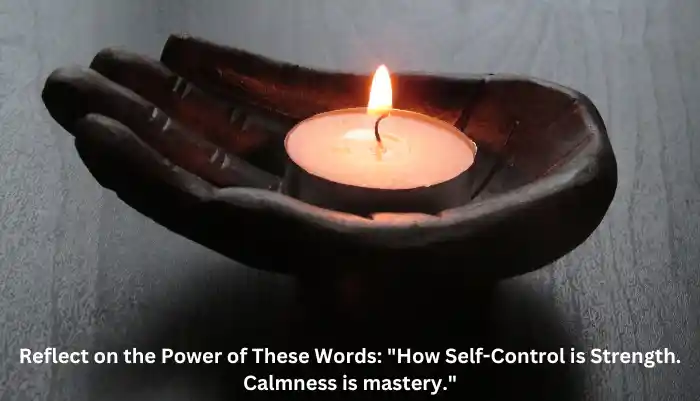Have you ever felt raw strength wasn’t enough to overcome a challenge? Let’s explore what it means when people say, “Self-control is strength. Calmness is mastery.” These words reveal the path to true power and mastery in life: self-control and calmness. Explore these words’ meanings and discover how they can impact our view of who we are and what we have the power to do.
Understanding Self-Control As Strength
Self-control is the ability to make sensible choices rather than hold back. It enables us to make calm decisions, wait for rewards, and stay calm during stress. Emotional intelligence and control of emotions are similarly significant as physical ability. Self-control keeps individuals on necessity, which helps everyone succeed—from focused athletes to diligent students. It also sets the stage for finding inner peace, giving us a clear head. Recognizing self-control as a strength is essential for personal growth, resilience, and happiness.
The Mastery of Calmness
Calmness isn’t just about keeping calm; it’s about controlling emotions rather than letting them control us. It helps us make clear decisions and communicate effectively. By practicing self-control, we can achieve this inner peace where resilience and clarity thrive.
The Power of Reflection of Self-Control is Strength. Calmness is Mastery.

Take a path of self-discovery as you analyze the linked domains of calm and self-control. Think back to those critical moments when you used self-control to achieve good things, and remember when you were at peace in a state of stress. Recognize their transformative impact on daily life, enhancing communication, productivity, and overall well-being. Embrace the timeless wisdom encapsulated in “How Self-Control is Strength. Calmness is Mastery,” striving to cultivate a balance of resilience and serenity in both traits. This journey empowers you to navigate life’s challenges with grace and purpose.
The Significance of Self-Control is Strength. Calmness is Mastery.
“Self-control is strength. Calmness is mastery.” This idea is critical to navigating life effectively.
Empowerment through control:
Self-control lets us make intelligent decisions and stay strong in tough times. Calmness helps, too, keeping our minds clear for thoughtful responses.
Inner Peace and Happiness:
Calmness isn’t just about avoiding chaos; it’s about feeling calm inside, even when things are crazy. It makes us emotionally intense and improves our relationships. Self-control sets the stage for personal growth and resilience.
In short, mastering self-control and calmness help us reach our potential, stay resilient, and find deep fulfillment.
Self-control is Strength. Calmness is Mastery—Quotes
Here are quotes that capture the essence of this idea:
- “Some things lead to happiness, others don’t.” – Epictetus
- “Stop debating what makes a good person. Be one.” Marcus Aurelius
- “Trust yourself first to succeed.” Ralph Waldo Emerson
- “Being able to wait is key to discipline.” Mihaly Csikszentmihalyi
- “Your actions create your happiness.” Dalai Lama
- “Peace starts inside you, not outside.” – Buddha
- “Think right to control your mind.” James Allen
- “You choose your attitude no matter what.” Viktor Frankl
- “Change your view to change what you see.” Wayne Dyer
- “Observe your thoughts to find peace.” Eckhart Tolle
- “Controlling oneself is the greatest strength; using it wisely is mastery.” James Allen
- “True mastery is mastering oneself, shown through calmness.” – Confucius
- “Real strength is controlling yourself, and calmness is its reward.” Lao Tzu
- “Achievement begins with self-control, completed by calmness.” Brian Tracy
The Intertwined Path

Balancing Strength and Peace:
Self-control and calmness work hand in hand, supporting each other.
Self-Control Promotes Calmness: We find inner peace when we control our emotions and impulses. It calms our emotions and clears our minds like an anchor in a wild sea. We may also exercise more self-control because of this calmness.
Calmness Boosts Self-Control: Impulse control and distraction avoidance improve with a calm mind. The capacity to remain quiet helps us face problems more efficiently and boosts our willpower. It’s like a serene lake; clarity helps us navigate and stay focused.
Building Both:
Good news! We can develop both self-control and calmness.
Self-Control:
Know Your Triggers: Recognize when situations or emotions impair your ability to keep calm.
Practice mindfulness: meditation and other techniques help you stay aware and make better decisions.
Start Small: Set achievable goals to build self-control over time gradually.
Calmness:
Relax: Try yoga or other relaxation methods to release tension and cultivate calmness.
Stay Positive: Counter negative thoughts with affirmations and focus on the good.
Be Present: Mindfulness keeps you grounded in the moment, promoting peace of mind.
Facing Challenges:
Life throws curveballs, but you can handle them.
Manage Stress: Exercise or relaxation techniques help manage stress and preserve self-control.
Handle temptation: identify and avoid temptations or devise strategies to resist them.
Stay Positive: Challenge negative thoughts with positive self-talk and focus on solutions.
Guiding Principle:
Remember, “Self-control is strength. Calmness is mastery.” By mastering self-control, you gain resilience to face challenges. With calmness, you approach life’s hurdles with clarity, ensuring a steady journey to success.
Read More: https://asseturi.com/golo-diet-pills-vs-traditional-weight-loss-is-this-the-better-option-for-you/
Harmony of Self-Control and Calmness
Self-control and calmness are vital for personal growth. Self-control helps us manage impulses, while calmness keeps our minds clear. Together, they build resilience and emotional balance. Strategies like mindfulness and self-care support their development. Leaders who promote their remaking power in achieving goals and finding inner peace include Tim Ferriss and Thich Nhat Hanh. Through accepting this harmony, we build satisfaction and endurance, which improve general well-being and personal progress.
Conclusion: Charting Your Course to Mastery
When mastering self-control and calmness, remember that it’s not a straightforward journey but one filled with internal challenges and opportunities for inner peace. Understanding “How Self-Control is Strength. Calmness is Mastery” provides essential tools for this adventure: self-control empowers you to make conscious choices, while calmness fosters clarity and resilience. These traits aren’t destinations but interconnected aspects of a fulfilling life. Take time to reflect, strategize, and remember that true mastery comes from conquering oneself. As you continue your journey, embrace self-awareness and let purpose guide you toward inner peace and fulfilment.
FAQs
- I often give in to temptations. How can I develop more self-control?
Like a muscle, self-control becomes stronger with use. Determine your triggers, then create preparations to avoid them or have backups. You can make better choices by raising awareness through mindful practices like meditation.
- I get stressed easily, making staying calm harder. What can I do?
Combat stress with exercises or deep breathing to release tension and induce calmness. Mindfulness exercises focusing on the present moment can detach you from worries, fostering a sense of tranquillity.
- Is calmness just about suppressing emotions?
Calmness isn’t about suppressing emotions but acknowledging and navigating them. Learning to respond to emotions rather than control them as you ride a wave.
- How can I use self-control and calmness to improve my relationships?
Mastering self-control enables effective communication and emotional management, nurturing stronger bonds. Cultivating calmness allows for empathetic listening and compassionate responses, fostering more profound connections.
- This sounds great, but how can I integrate these ideas into my daily life?
Regular self-reflection is essential. Reflect on instances where self-control and calmness were effective or challenging. Use this awareness to develop strategies for improvement. Remember, it’s a journey of progress, not perfection. Celebrate your achievements and keep moving forward.
Click Here to read more about Asseturi.

Leave a Reply